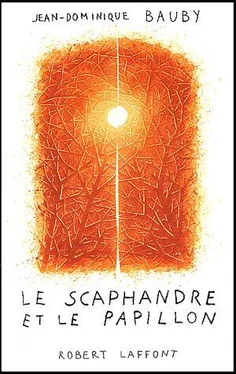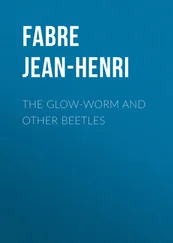Although my own corner of the hospital has the look of an expensive private school, one would never mistake the cafeteria crowd for members of the Dead Poets Society. The girls have hard eyes, the boys tattoos and sometimes rings on their fingers. There they sit, chain-smoking and talking about fistfights and motorbikes. Their already stooped shoulders seem to bear a heavy cross. Cruel fate has cursed them, and their stay at Berck is just one more stage between an abused childhood and a jobless future. When I am wheeled through their smoke-filled lair, the silence becomes deafening; I see neither pity nor compassion in their eyes.
Through the open cafeteria window you can hear the beating of the hospital's bronze heart: the bell that makes the firmament vibrate four times an hour. On a table cluttered with empty cups stands a small typewriter with a sheet of pink paper stuck in the roller. Although at the moment the page is utterly blank, I am convinced that someday there will be a message for me there. I am waiting.
In a dream last night, I visited Paris's wax museum, the Musée Grévin. It had changed. There was the same entrance, in turn-of-the-century style, the same distorting mirrors, the same chamber of horrors, but the galleries displaying contemporary figures were gone. In the first rooms, the characters on exhibit were in street clothes, and I did not recognize them until I mentally put them in white hospital uniforms. Then I realized that these boys in T-shirts and girls in miniskirts, this housewife frozen with teapot in hand, this crash-helmeted youth, were all in fact the nurses and orderlies of both sexes who took turns appearing morning and night at my hospital bedside. They were all there, fixed in wax: gentle, rough, caring, indifferent, hardworking, lazy, the ones you can make contact with and those to whom you are just another patient.
At first some of the staff had terrified me. I saw them only as my jailers, as accomplices in some awful plot. Later I hated some of them, those who wrenched my arm while putting me in my wheelchair, or left me all night long with the TV on, or let me lie in a painful position despite my protests. For a few minutes or a few hours I would cheerfully have killed them. Later still, as time cooled my fiercest rages, I got to know them better. They carried out as best they could their delicate mission: to ease our burden a little when our crosses bruised our shoulders too painfully.
I gave them nicknames known only to me, so that when they entered my room I could hail them in my thunderous inner voice: “Hey, Blue Eyes! Morning, Big Bird!” They of course remained unaware. The one who dances around my bed and strikes an Elvis pose as he asks “How are you doing?” is “David Bowie.” “Prof” makes me laugh, with his baby face and gray hair and the gravity with which he utters the unvarying judgment: “So far, so good.” “Rambo” and “Terminator,” as you might imagine, are not exactly models of gentleness. I prefer “Thermometer” her dedication would be beyond reproach if she did not regularly forget the implement she thrusts under my armpit.
In my dream, the museum sculptor was not altogether successful in capturing the smiles and scowls of Berck's hospital personnel, northerners whose ancestors have always lived on this strip of France between the Channel coast and the rich fields of Picardy. They readily lapse into their local patois as soon as they are alone together. To get them right you would need the talent of one of those medieval miniaturists whose magic brush brought to life the folk who once thronged the roads of Flanders. Our artist does not possess such skill. Yet he has managed to capture the youthful charm of the student nurses with their dimpled country-girl arms and full pink cheeks. As I left the room, I realized that I was fond of all these torturers of mine.
Entering the next exhibit, I was surprised to find myself back in Room 119, apparently reproduced down to the last detail. But as I got closer, the photos, drawings, and posters on my walls turned out to be a patchwork of ill-defined colors. Like an Impressionist painting, it was a pattern intended to create an illusion at a certain distance. There was no one on the bed, just a hollow in the middle of the yellow sheets bathed in pallid light. And here I had no problem identifying the watchers on either side of the bed: they were members of the personal bodyguard that spontaneously sprang up around me immediately after the disaster.
Michel, seated on a stool and conscientiously scribbling in the notebook where visitors set down all my remarks. Anne-Marie, arranging a bouquet of forty roses. Bernard, holding a memoir of diplomatic life in one hand and with the other executing a theatrical barrister's gesture that was pure Daumier. Perched on the end of his nose, his steel-rimmed glasses completed the picture of a distinguished courtroom orator. Florence, pinning children's drawings on a corkboard, her black hair framing a sad smile. And Patrick, leaning against a wall, apparently lost in thought. Looking almost ready to leap into life, the group projected great tenderness, a shared sorrow, an accumulation of the affectionate gravity I feel whenever these friends come to see me.
I tried to continue the tour and see what fresh surprises the museum had in store, but in a gloomy corridor a guard turned his flashlight full on my face. I had to shut my eyes tight. When I awoke, a real nurse with plump arms was leaning over me, her penlight in her hand: “Your sleeping pill. Do you want it now, or shall I come back in an hour?”
On the benches of the Paris school where I wore out my first pair of jeans, I made friends with a skinny, red-faced boy named Olivier, whose runaway mythomania made his company irresistible. With him around, there was no need to go to the movies. Olivier's friends had the best seats in the house, and the film was a miracle of invention. On Monday he would amaze us with a weekend saga straight out of A Thousand and One Nights . If he had not spent Sunday with Johnny Hallyday, it was because he had gone to London to see the new James Bond, unless he had been driving the latest Honda. (Japanese motorbikes, just then arriving in France, were all the rage in schoolyard discussions.) From morning to night our friend fed us small lies and gross fabrications, brazenly inventing new stories even when they contradicted preceding ones. An orphan at 10:00 a.m., an only son at noon, he could dig up four sisters by midafternoon, one of them a figure-skating champion. As for his father—in reality a sober civil servant—he became, depending on the day, the inventor of the atom bomb, the Beatles' manager, or General de Gaulle's unacknowledged son. Since Olivier neglected to give coherence to the dishes he served up, we would have been the last to expect consistency of him. When he came out with some utterly outlandish fable we would voice tentative doubts, but he defended his good faith with such indignant protests of “I swear!” that we would swiftly back down.
When I last checked, Olivier was neither a fighter pilot nor a secret agent nor adviser to an emir (careers he once considered). Fairly predictably, it is in the advertising world that he wields his inexhaustible faculty for gilding every lily.
I should not feel morally superior to Olivier, for today I envy him his mastery of the storyteller's art. I am not sure I will ever acquire such a gift, although I, too, am beginning to forge glorious substitute destinies for myself. I am occasionally a Formula One driver, and you've certainly seen me burning up the track at Monza or Silverstone. That mysterious white racer without a brand name, a number, or commercial advertisements is me. Stretched out on my bed—I mean, in my cockpit—I hurl myself into the corners, my head, weighed down by my helmet, wrenched painfully sideways by gravitational pull. I have also been cast as a soldier in a TV series on history's great battles. I have fought alongside Vercingetorix against Caesar, turned back the invading Arabs at Poitiers, helped Napoléon to victory, and survived Verdun. Since I have just been wounded in the D-day landings, I cannot swear that I will join the airdrop into Dien Bien Phu. Under the physical therapist's gaze, I am a Tour de France long shot on the verge of pulling off a record-setting victory. Success soothes my aching muscles. I am a phenomenal downhill skier. I can still hear the roar of the crowd on the slope and the singing of the wind in my ears. I was miles ahead of the favorites. I swear!
Читать дальше












